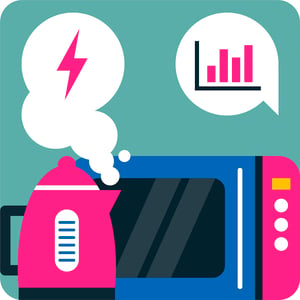Demystifying Green Jargon: Understanding Key Climate Terms
In our daily conversations, we often throw around terms like 'carbon footprint', 'net-zero', or 'green', especially when discussing our actions and their impact on the environment. But how many of us understand the meanings behind these phrases?
If you feel lost in a sea of eco-vocabulary, you're not alone! A recent study conducted in the UK revealed that a majority of people struggle to grasp some of the most commonly used climate-related language. Shockingly, three-quarters of those surveyed couldn't provide clear definitions for key terms.
Wasted energy makes up 30% of the average energy bill - do something about it! Get more from your smart meter with Loop.
As the urgency of the climate crisis continues to grow, it becomes increasingly vital for all of us to familiarise ourselves with these crucial concepts. That's why we've compiled this handy climate jargon buster!
Let's break down some of these terms:
2 Degrees: If the global temperature goes up by 2 degrees, it's seen as a tipping point where serious and widespread effects of human-caused climate change start to kick in. You might have also heard phrases about keeping warming limited to ‘1.5 degrees’. This is the global benchmark for climate action.
.jpg?width=300&height=300&name=Clued%20up%20about%20climate%20change%201%20(2).jpg)
5-Tonne Footprint: This target is increasingly seen as the ideal maximum for individuals striving towards zero emissions. Embracing a 5-tonne lifestyle represents a significant reduction compared to the UK’s average carbon footprint. However, carbon dioxide emissions per person will have to be below 2.1 tonnes annually by 2050 for us to achieve limiting global temperatures to well below two degrees.
Circular Economy: Also known as ‘closed loop’, this is a way of creating products that last longer and cut down on waste. Every part of the product lifestyle is considered - from sustainable design, production, consumption, reuse and repair, and waste management. It’s about less raw material, less waste, and fewer emissions.
Carbon Emissions: This refers to the release of carbon dioxide (CO2) and other greenhouse gases into the atmosphere, primarily through human activities such as burning fossil fuels (coal, oil, and natural gas), deforestation, and industrial processes.
Carbon Footprint: Your carbon footprint is the total amount of carbon emissions generated from your lifestyle and actions. Your home energy and travel habits make up a significant part of your emissions, but it also includes the food you eat and the goods and services you buy. The average yearly individual carbon footprint is around 13 tonnes.
Carbon Intensity: Carbon intensity gauges the cleanliness of the electricity produced by the National Grid. It indicates the amount of carbon dioxide (CO2) emitted per kilowatt hour (kWh) of electricity generated. This is dependent on the mix of renewable sources and fossil fuels being used. You can view the carbon intensity forecast of the National Grid with Loop’s EcoMeter. By shifting high-energy tasks, like running your washing machine, to greener times, you can lower your impact.
Carbon Neutral: This refers to achieving a balance between the carbon dioxide emissions produced through a particular action with the carbon dioxide emissions being removed through another action, like tree planting. Overall, they balance each other out.
.jpg?width=300&height=300&name=Greener%20energy%20-%20a%20timeline%201%20(1).jpg)
Carbon Offset: This is a credit purchased by individuals or organisations to reduce their carbon footprint. Carbon neutrality occurs when the number of carbon offset credits purchased matches the carbon footprint of the individual or organisation. This can be achieved through reforestation projects or renewable energy infrastructure development for example.
Decarbonisation: This refers to the process of reducing or eliminating carbon dioxide (CO2) release into the atmosphere, which is achieved by transitioning to low-carbon energy sources. At Loop, our mission is to accelerate the decarbonisation of UK households and we aim to do this by helping users improve their energy efficiency and making the bigger changes, like fitting solar panels and improving insulation, easy to adopt.
Eco-Anxiety: Also known as climate anxiety, this is the name given to the increased anxiety or despair that people feel about the environment and their perceived helplessness to make a difference.
Eco-Friendly: This describes products, events, and services that do not harm the earth and do the least possible damage.
Eco-Guilt: This is the feeling when you believe you could have taken action to help the environment or mitigate environmental harm but were unable to do so. It arises when individuals feel they have fallen short of their personal or societal expectations for environmentally responsible behaviour.
Energy-Efficient: An item or task that uses the least amount of energy. At Loop, we promote energy efficiency in all things from new appliances to eco-modes! These simple choices are better for the planet and ultimately - your wallet!

Fossil Fuels: This describes the fuels that cannot replenish themselves, like oil and coal. There is a finite amount of these resources, unlike renewable energy. They are formed from plant and animal remains from millions of years ago.
Greenhouse Gases: These are gases in the atmosphere that trap heat and contribute to global warming. They are often produced by the burning of fossil fuels.
Green: This is used to describe something as being environmentally aware. It’s a term often used in advertising, which can describe people, places, or organisations that pose as little risk to the environment as possible.
Greenwashing: This describes suggestive advertising that makes consumers believe a product is more environmentally friendly, natural, or chemical-free compared to other brands than it is.
Net-Zero: This describes the balance between the amount of carbon produced and removed from the atmosphere. The UK government has set a target to achieve net zero by 2050.
Did you know you can take matters into your own hands? With Loop’s Carbon Calculator, you can discover your household’s journey to net zero. See the impact of increasing efficiency, installing solar panels, improving insulation, and electrifying your heat and transport.
Renewables: Renewable energy refers to sources that naturally replenish themselves, such as solar and wind power. These sustainable energy sources contribute to the National Grid's electricity supply, powering the nation, and are utilised by individual households through technologies like solar panels.
Are you interested in installing solar panels? At Loop, we’re here to help you make an informed decision with our Solar Simulator.
.jpg?width=300&height=300&name=The%20benefits%20of%20generating%20your%20own%20solar%202%20(1).jpg)
Single-Use Plastics: Plastic items that are only used once before being thrown away or recycled. This includes plastic bags, plastic straws, and disposable cups.
Sustainability: This is the ability to maintain or support a process over time. It encompasses three fundamental pillars: economic, environmental, and social considerations. Numerous businesses and governments have pledged to achieve sustainable objectives, such as minimising their environmental impacts and preserving resources.
Wishcycling: Also known as aspirational recycling, this describes throwing something into the recycling bin and hoping it'll get recycled - even though it's not likely to happen! People do this because they're not sure about what can be recycled, or they think the item might still be useful in some way. However, it can have the opposite affect as it can contaminate other recycling and it will all end up in landfill instead.
Zero-Waste: To achieve zero waste you need to generate less everyday waste, repair your things to reuse, and prioritise more recyclable packaging. Whilst this might only be an aspirational lifestyle for many at the moment, it’s a great way to prompt planet-friendly thinking. For instance, do you really need to buy a plastic water bottle or simply remember to pack a reusable one?
.jpg?width=300&height=300&name=The%20power%20of%20one%202%20(3).jpg)
By making environmental concepts accessible, everyone can stay informed and become empowered to make a difference. When we all understand the significance of terms like 'carbon footprint' or 'net-zero', we’re more likely to take meaningful actions to reduce our environmental impact. After all, if you don't understand a term, it's hard to care about it!
But, by breaking down complex jargon and providing clear explanations, we can inspire widespread understanding and action towards a more sustainable future.
• • •
Cut Your Energy Bill With Loop
Loop is a FREE energy-saving app that links to your smart meter, analyses your energy use and shows you easy ways to save. On average, Loop users cut their energy use by 15%! How much could you save?








